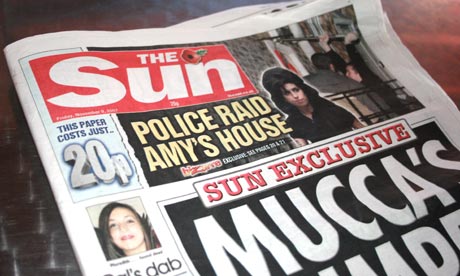Sun and Daily Mail guilty of contempt over online photo in murder case
In landmark ruling for internet publishing, high court finds publication of photo of defendant risked prejudicing trial

The Sun and the Daily Mail have been found guilty of contempt of court for publishing a picture of a murder trial defendant posing with a gun on their websites.
In a landmark ruling for internet publishing, the high court found that the publication of the photograph created a "substantial risk" of prejudicing the defendant's murder trial in November 2009.
The papers, the two most widely read titles in the UK, published the photograph of Ryan Ward online for a matter of hours before being ordered to take it down. Neither paper published the picture in print.
Ward was eventually found guilty of murdering car mechanic Craig Wass in the 2009 Sheffield crown court trial.
Dominic Grieve, the attorney general, said last month that the Sun and Daily Mail could have "seriously impeded or prejudiced" Ward's trial with the publication.
Angus McCullough QC, acting for the attorney general, said both newspapers had breached the strict liability rule under the 1981 Contempt of Court Act, which states that publishing an article or picture may be contempt, even though there is no actual "intent" to interfere with the course of justice.
Lawyers for the two titles argued that risk of prejudice was "insubstantial" because the picture was quickly taken down and jurors had been strictly ordered not to search the internet.
However, Lord Justice Moses and Mr Justice Owen, in their judgment on behalf of the court, said on Thursday: "We conclude that the nature of the photograph created a substantial risk of prejudicing any juror who saw that photograph against the defendant Ward."
Moses added: "Once information is published on the internet, it is difficult if not impossible completely to remove it. The courts, while trusting a jury to obey a prohibition on consulting the internet, have been concerned to meet the problem.
"This case demonstrates the need to recognise that instant news requires instant and effective protection for the integrity of a criminal trial."
The judges will consider what penalties and costs orders to impose on Associated Newspapers, publisher of the Daily Mail, and News Group Newspapers, publisher of the Sun, at a future date.
